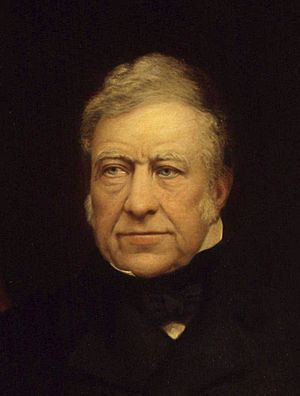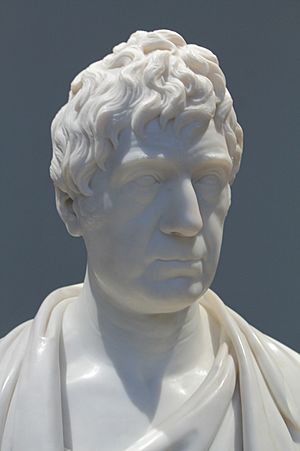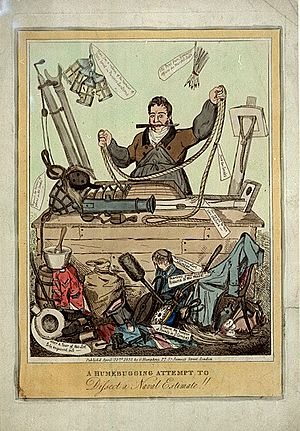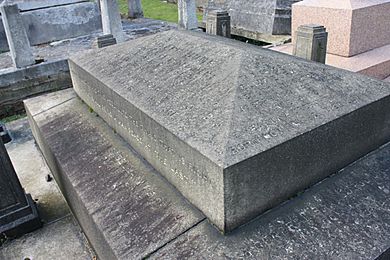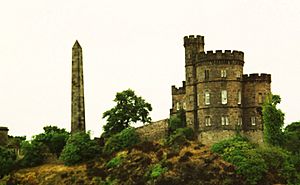Joseph Hume facts for kids
Joseph Hume (born January 22, 1777 – died February 20, 1855) was a Scottish surgeon. He also became a well-known politician, serving as a Member of Parliament (MP). He was known for being a "Radical" politician, meaning he wanted big changes to how the country was run.
Contents
Who Was Joseph Hume?
Joseph Hume was a very active and determined person. He started his career as a doctor and then became a politician. He spent many years in the British Parliament. There, he worked hard to make things fairer for ordinary people. He pushed for changes in government spending and workers' rights.
Early Life and Medical Journey
Joseph Hume was born in a town called Montrose, Angus in Scotland. His father, James Hume, was a shipmaster but sadly passed away when Joseph was young. Joseph went to Montrose Academy for school. From 1790, he began training to be a surgeon and apothecary.
He studied medicine at the University of Aberdeen and then at the University of Edinburgh. Before he finished his studies, he worked as a surgeon's assistant on a ship during wartime. He also spent about 18 months on a ship called the Hope.
In 1799, Joseph Hume traveled to India. He worked as a surgeon for the 7th Sepoy Regiment. While there, he learned to speak Hindustani and Persian. This helped him work as an interpreter. He also took on other jobs, like managing supplies for the army. He even found a way to fix damp gunpowder, which caught the attention of a general.
Returning Home and New Interests
In 1808, Joseph Hume left the army and returned to the United Kingdom. He had saved a lot of money, about £40,000, which was a large fortune back then. For the next few years, he traveled around England and Europe.
In 1818, he was chosen to be a Fellow of the Royal Society. This is a special group for important scientists and thinkers. His nomination said he was good at chemistry and knew a lot about languages and old things from the East.
Starting His Political Path
First Steps in Parliament
In 1812, Joseph Hume became an MP for Weymouth in England. He was elected without anyone running against him. At first, he supported the Tory party. However, he soon showed he was independent. He disagreed with some decisions, which made some powerful people unhappy. He lost his seat in the next election.
During this time, he became friends with the Duke of Kent. The Duke was the father of the future Queen Victoria. Joseph Hume even introduced his daughter, Princess Victoria, to a famous explorer later on.
Becoming a Radical Thinker
After losing his seat, Joseph Hume met Francis Place in 1813. Place was a key figure in a group of political radicals. These were people who wanted big changes in society and government. Hume became closely involved with this group.
He also renewed his friendship with James Mill. Both Hume and Mill, along with Place, were interested in new ideas for schools. By the 1820s, Hume was known as one of the "Philosophical Radicals." These were followers of thinkers like Mill and Jeremy Bentham. They believed in using reason and logic to improve society.
Around this time, Hume also wanted to become a director of the British East India Company. He met Maria Burnley while trying to get this position, and they married in 1815.
Representing Scottish Towns
In 1818, Joseph Hume was elected to Parliament again. This time, he represented the Aberdeen Burghs in Scotland. He ran on his own "radical" ideas for change.
He also got involved in local politics in Aberdeen. He was elected as the rector of Marischal College in Aberdeen several times. He tried to bring back an old court system there, but it caused some problems. He eventually decided to run for a different seat in Parliament.
Later Political Roles
In 1830, Joseph Hume helped start the Metropolitan Political Union in London. This group wanted things like all men being able to vote and secret ballots in elections. That same year, he was elected as an MP for Middlesex in England. He worked on bills to change local government.
Later, he represented Kilkenny in Ireland (1837). From 1842 until he died, he represented the Montrose Burghs again.
Joseph Hume: A Champion for Change
Joseph Hume was known for being a very persistent politician. He campaigned on many different issues. People described him as determined, even if he wasn't the most exciting speaker. He was often called "the leader of the parliamentary Radicals."
He was especially focused on how the government spent money. His group was even nicknamed "The Mountain" because they were so strong in their beliefs. He often annoyed other politicians, even those on his side, because he was so stubborn. However, he gained respect for his dedication.
Fighting for Fair Finances
Hume made it a habit to question every single item of government spending. He pushed for a committee to look into how much it cost to collect taxes. He also helped get rid of a system called the "sinking fund." He added the word "retrenchment" (meaning cutting down on spending) to the Radical party's goals of "peace and reform."
He even suggested bringing back a small coin called the groat, or four pence, in 1836. It was nicknamed the 'joey' after his Christian name. This coin was useful for paying small fares on London buses.
Helping Workers and Trade
Joseph Hume played a big part in changing laws that affected workers. He helped repeal the Combination Act 1799 and Combination Act 1800. These laws made it illegal for workers to form unions or act together. This change was meant to help workers and employers get along better.
He also helped get rid of laws that stopped machinery from being sent out of the country. And he ended the law that prevented workers from going abroad to find jobs.
Military Reforms and Rights
Hume spoke out against the use of flogging (a harsh punishment) in the army. He believed that some army positions should be given to soldiers who started from the lower ranks. This idea was strongly opposed by powerful military leaders.
He also campaigned against forcing sailors into the navy (called impressment). And he fought against people being put in prison just because they owed money.
Later Life and Legacy
His Home and Final Resting Place
In 1824, Joseph Hume bought an estate in Norfolk, England. He named the house there Burnley Hall, after his wife's family name. This became his main home. He passed away there in 1855. He is buried in Kensal Green Cemetery in London, next to his good friend William Williams.
Remembering Joseph Hume Today
After his death, a special fund was set up to create a Joseph Hume Scholarship. This scholarship helps students at University College London study law and economics. It is still awarded today! Hume also gave his large collection of about 5,000 pamphlets to the university.
The small groat coin was indeed known as a "Joey" because of Joseph Hume. He had strongly suggested making these coins to help people pay for things like short taxi rides.
Honoring Political Heroes
In 1837, Joseph Hume started a plan for a memorial to the "Scottish Political Martyrs." These were people who suffered because of their political beliefs in the 1790s. On August 21, 1844, a large crowd gathered to see Hume lay the foundation stone for this monument in Old Calton Cemetery in Edinburgh.
In 1852, a second monument to these Scottish Political Martyrs was unveiled in Nunhead Cemetery, London. This was also started by Joseph Hume.
Images for kids
 | May Edward Chinn |
 | Rebecca Cole |
 | Alexa Canady |
 | Dorothy Lavinia Brown |


